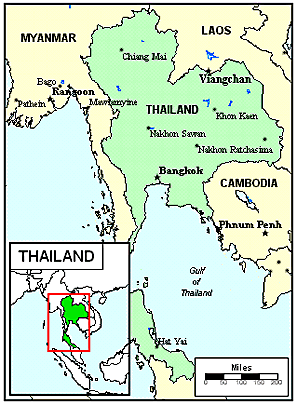Many Japanese have moved to Thailand because it provides an offshore base for their export-oriented industries. A number of Japanese live in Bangkok, Thailand's capitol. The Japanese have been drawn to Thailand for four main reasons. First, Japan and Thailand are both monarchies with frequent royal exchanges. Second, they share a common religion, Buddhism. Third, the two countries have never been at war with each other. Finally, the most compelling reason is that the government has a laissez-faire approach to business with comparatively little red tape for potential investors. Japanese businessmen recognize Thailand as a civilized country where contacts are respected, government intervention is minimal, and Thai workers are industrious.
Regarded as temporary residents, the Japanese work in diplomatic missions, represent Japanese business interests, and provide technical aid. The Japanese in Thailand are prosperous, but hard working. They have very little spare time to spend with their families or deal with their spiritual needs.
Shintoism is the native religion of many Japanese. It is rooted in animism (belief that animals and non-living objects have spirits), and its many gods or spirits are known as kami. Buddhism was introduced to Japan in the sixth century. Today, most Japanese claim to be both Shintoist and Buddhist.
Traditions of Shintoism, Buddhism, Confucianism, and Taoism have all contributed to Japanese religious principles: ancestor worship, a belief in religious continuity of the family, a close tie between the nation and religion, a free exchange of ideas among religious systems, and religious practices centered on the use of prayer meditation, amulets, and purification.
The Japanese in Thailand are indifferent or pragmatic regarding religious observances. They want a religion that meets their physical needs. Many are obsessed with materialism, careers and status. They need to understand that their spiritual needs are even greater, and these needs can only be met through a relationship with Jesus Christ.
Pray for a spiritual hunger among the Japanese in Thailand.
Pray that this will be the decade where there is a movement to Christ among the Japanese in Thailand.
Pray for the Holy Spirit to raise up 1,000 faithful, loving ambassadors of Christ among the Japanese who will take Christ to others in Thailand.
Scripture Prayers for the Japanese in Thailand.
| Profile Source: Joshua Project |















